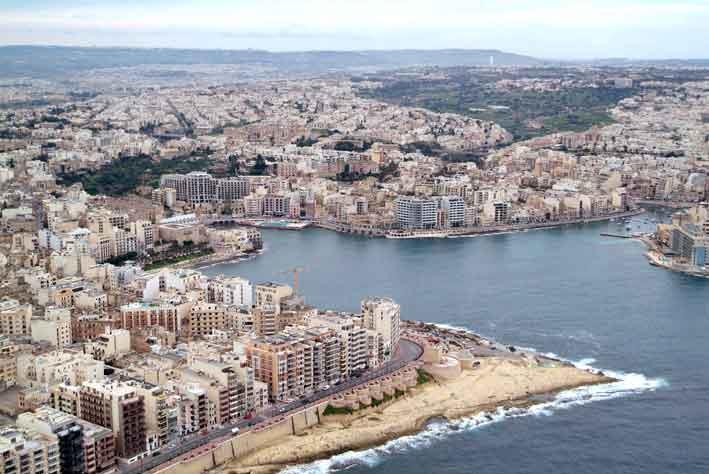The Church Environment Commission has made a number of recommendations for the planning sector in Malta, reflecting on the current state of development planning and expressing their concern about the direction of the sector in the country.
The Commission states that taking the developers' side and not that of the wider community has become a feature of land-use planning in Malta when it comes to proposed developments.
"This trend is manifestly evident in the preparation of the original Paceville Masterplan where the main aim of the exercise was the combination of a few developers' projects with hardly any concern for communities' concerns. It was only after vociferous protests by the communities that this plan was withdrawn. However, in the process, too many resources were wasted because at the core of the process it was the interest of a few developers that was of paramount importance. The construction of tall buildings in the middle of urban areas is also an effect of this approach to planning."
Publication of revised local plans
While towers are being built among communities in Gzira and Sliema, the local plans which should put communities at the centre of planning have not yet been published, the Commission said.
"This failure to publish the local plans stands in stark contrast to statements from minister after minister responsible for planning to the effect that such plans would be published within specified timeframes which have now long elapsed. It is when an economy is booming that planning becomes more essential because the relaxation of policies and plans to accommodate a few people will make life unbearable to others who have to absorb the negative effects of such developments. It is of deep concern that while new local plans are still unpublished, partial reviews of the existing local plans are being carried out which are changing different areas in such local plans in a piecemeal fashion with only a few people in the country, if any, knowing what the combined effects of such changes would be."

They appealed to the Planning Authority to immediately carry out an exercise to identify and address conflicts that may exist between various planning policies and between such policies and development plans, including local plans.
The Commission asked whether the publication of the local plans is being held hostage by pre-electoral promises to various individuals to extend the development boundaries?
"Promising the Earth to various individuals risks imploding the whole planning governance system in the country."
The Commission said that it seems government has retreated from planning and left the urban and natural environments to be exploited by developers with as few controls as possible. "This approach is clear when one considers policies relating to the construction of tall buildings in the middle of urban areas, and developments in rural areas. These policies are wreaking havoc in urban and natural environments."
The Constitution and the environment
The Commission said that there is a lot that can be done to protect the environment by changing all the plans and policies that are compromising it "without waiting for a process that nobody knows when it will start let alone when it will end. There is no need for a Constitutional Convention to publish local plans that do not extend the present development boundaries and which show how communities are going to be served by better planning. There is no need to change the Constitution for Government not to allow developments in areas that are outside development zones."
The Environment Commission reiterated that the Environment and Resources Authority, and the Superintendence of Cultural Heritage should be granted a veto in cases of development applications relating to areas within their competence.

"The Environment Resources Authority is, by design, not able to fulfil its role to safeguard communities from unbridled short-termism that is the result of uncontrolled market forces."
They appealed so that in the development planning application process, the consultations required from the Superintendence of Cultural Heritage and the Environment Resources Authority would not be constrained by the 30-day response period beyond which the Planning Authority deems that there is no objection from such consultees.
The Commission said that it is concerned that plans and policies are not being formulated on a community-based vision, supplemented by hard facts that are meaningful for the proper planning and execution of such plans and policies. "For the last two years, the Commission has been appealing to Government to commit itself to carry out a property study and update it every year. However, instead of carrying out a study of its own, with the terms of reference agreed upon by a wide spectrum of stakeholders, and then publishing the study in its entirety, government has preferred to be present at the launch of a study by the private sector."
The proposed property study needs to ascertain whether the development projects being currently built, when added to those that are currently being negotiated with the Planning Authority will not produce a bubble which will have serious implications on the country when it bursts, The Commission said.
"Such study needs also to investigate the extent to which the Citizenship by Investment Programme (IIP) is inflating prices in the country and whether the possibility of money laundering activities is contributing to this phenomenon. In a market where information spreads very fast, a few transactions can have an impact on the whole market. The study should address demographic projections, the demands for industrial, commercial and office space that is really required by new or expanding economic sectors together with the risks attached to the over-reliance and growth of such sectors. Although obviously there is no bubble bursting now, Commission can never be convinced that the country may not be heading towards one in the future unless a published study proves otherwise."

The Commission said that the Planning Authority, the Environment and Resources Authority, the Lands Authority, the Attorney General's Office and Parliament are the foremost institutions in granting public land, regulating its use and ensuring that conditions attached to granting of land and development permissions are respected. "There cannot be proper governance of public land without ensuring full transparency and respect of the laws and treating all bidders for public land equally."
They appealed to all professionals at these institutions to uphold their responsibilities towards the current and future generations.
Regarding statements in the media about SmartCity, the Environment Commission would welcome a statement from government as to whether the development there and the current plans for the area depart from the agreement that was approved by Parliament or the Masterplan approved by the then MEPA. "This project has been the subject of various claims carried by the media which do not seem to have been denied by an official statement to date. At the same time, one cannot turn a blind eye to the proliferation of so-called 'massage parlours' in residential neighbourhoods. Judging from reports in the media published these last few months one wonders whether the services offered in these places and the way they are run, are subjected to some kind of monitoring."
Lastly, the Commission appealed to the authorities to safeguard trees in road widening projects.